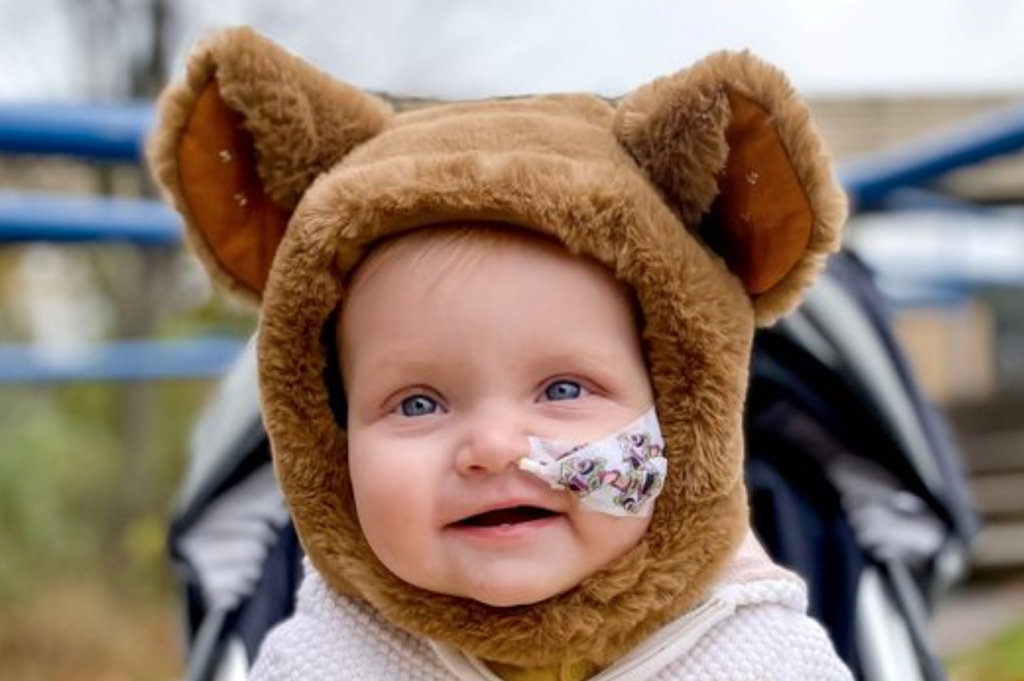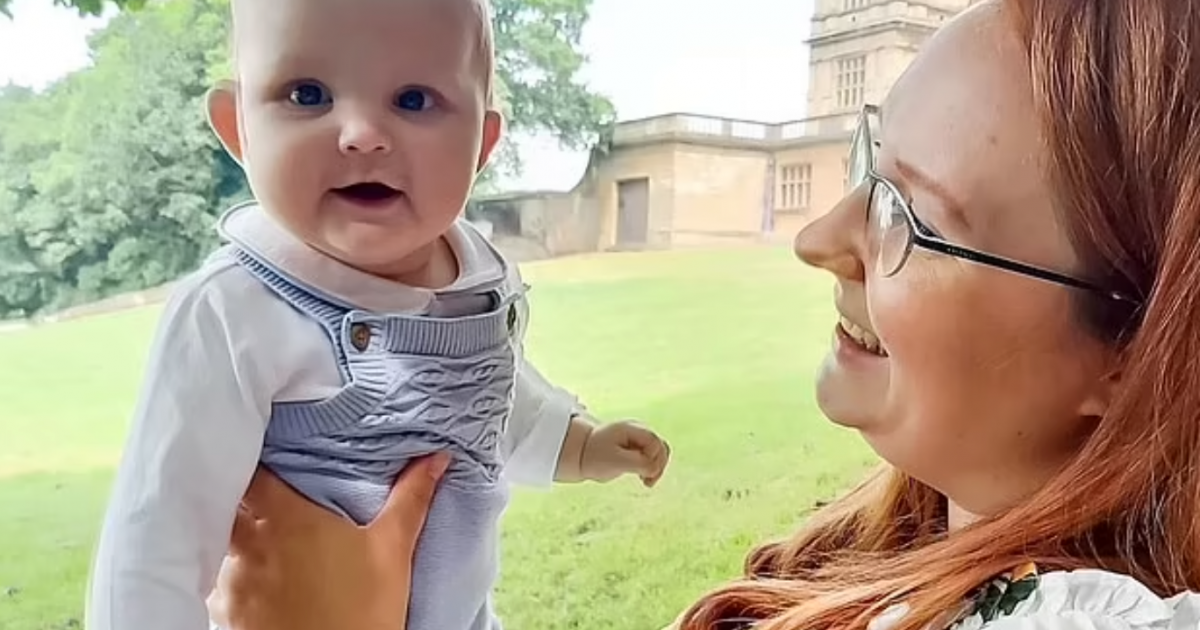A Mother's Daunting Challenge
- A mother from Nottingham, England, went through such a horrific tragedy with her baby boy’s rare cancer, that she is sharing her story far and wide to help other parents potentially identify symptoms of child cancer.
- Jessica Neal, 38, and her husband Lee, 35, were on vacation in Wales when they noticed their baby son Ted, 11 months, had an irritated eye. After multiple tests, doctors gave them a devastating diagnosis, an extremely rare type of sarcoma.
- Figuring out if your child has cancer based on possible symptoms is critical because early detection may help with treatment and outcomes. Jessica did the right thing by immediately taking her baby in to get checked.
Jessica Neal, 38, and her husband Lee, 35, were on vacation in Wales when they noticed their baby son Ted, 11 months, had an irritated eye.
Read More
"I wasn't really worried about it at first- I thought it was just a virus," Jessica told North Wales Live. "But they couldn't work out what it was."
Baby Ted’s face had “completely changed” within a week of diagnosis, and he immediately had to have surgery and began chemotherapy.
Even scarier, an ultrasound showed that Ted’s brain was being “pushed forward” due to space left in his skull from the prior surgery. Further testing in March showed that the cancer had spread to the baby’s brain and spinal cord.
Related: Warning Signs! The Top Ten Childhood Cancer Symptoms That Can Be Missed
Tragically, Ted did not survive. While a mother’s loss of a child is unfathomable, Jessica still at least had one positive to hang on to.
“I'm so glad I trusted my instincts as I think we would have lost him sooner if I hadn't,” she said. “It gave us that eight months with him.”
"His eye hadn't swelled that much when I took him in but I just had a feeling and within a week his face had completely changed and we had the diagnosis. Suddenly he was started on chemotherapy and our lives had changed.”
The Impact of a Childhood Cancer Diagnosis on the Whole Family
Despite her immense loss with losing her son, Jessica finds peace in the fact that Ted battled so hard at such an infantile stage. “Sadly he lost his life when the cancer spread to his brain but we'll have those eight months of memories forever."
Ted underwent six rounds of chemotherapy, but doctors eventually said they needed to take him off. It simply wasn’t doing anything.
The news was so sudden and shocking to Jessica and Lee and she described how there is “nothing that can prepare you for that”.
“I was expecting them to tell us nothing was wrong – but they didn’t.
“As parents it’s the worst thing you could find out, and the unknown type of sarcoma is incredibly rare and so is where it was in Ted’s body, so finding out it’s not going to be easy to treat is the worst thing. There’s no known treatment plan and there’s no known process."
9-year-old Lilly Bumpus is Seven Years in Remission from Ewing Sarcoma
Ted underwent six rounds of chemotherapy, and things had looked hopeful for the family. “We had him home ten days after which was amazing.”
He spent last Christmas at home, and died a few months later at sixteen months.
Now, the family has set up a foundation in honor of their heroic son, with the sole purpose of helping other parents avoid the type of pain they have suffered.
"I have so many happy memories from the last eight months Ted was with us – even though it was tough. I would urge anyone to trust their instincts if they think something is wrong. Even if it just gives you peace of mind."
What Kind of Cancer is Sarcoma?
Sarcomas are cancers that arise from the cells that hold the body together. They can occur in muscles, nerves, bones, fat, tendons, cartilage or other forms of connective tissues.
"There are hundreds of different kinds of sarcomas, which come from different kinds of cells," Dr. George Demetri, director of the Sarcoma and Bone Oncology Center at Dana-Farber Cancer Institute and Harvard Medical School, previously told SurvivorNet.
The word sarcoma refers to a large array of bone and soft tissue cancers. Those are then further broken down into more specific forms of the disease, including:
- Ewing's sarcoma Cancer that typically occurs in and around the bones, often in the arms or legs, or the bones of the pelvis. It most commonly occurs in children and young adults.
- Kaposi sarcoma Rare type of cancer that causes lesions on the skin, in lymph nodes, organs and the mucous membranes of the mouth, nose, and throat. It typically affects people with compromised immune systems, such as those with HIV.
- Epithelioid sarcoma Soft tissue cancer that grows slowly. It's likely to begin under the skin of areas like the finger, hand, forearm, lower part of the leg or foot.
- Synovial sarcoma Known also as a malignant synovioma, this is a cancer that can form soft tissues such as muscle or ligaments, commonly close to joints or in areas like the arm, leg or foot.
- Osteogenic sarcoma Known also as osteosarcoma, this cancer forms in the bone and is most common in young children.
- Spindle cell sarcoma Rare form of the disease that accounts for less than 2% of all primary bone cancer cases. It's most common in adults over age 40 and often forms in the bones of the arms, legs and pelvis.
- Angiosarcoma This cancer appears in the lining of the blood vessels.
- Liposarcoma This cancer develops from fat cells and often occurs in the torso, limbs or deep within the abdominal lining.
- Chondrosarcoma This cancer occurs in the cells of the cartilage, mostly in adults over the age of 40.
Advocating for Your Child
Here at SurvivorNet, we always encourage people to advocate for themselves when it comes to cancer and, more generally, health care. When it comes to a child, the parent must become the advocate.
And even if you're called "pushy" or people dismiss the concerns you have for your child, it's important to remember that you never know when speaking up about a seemingly unproblematic issue can lead to a very important diagnosiscancer or otherwise.
Related: Worried Mom, 21, Noticed Her Baby Was 'Slightly Squinting:' It Turned Out To Be Cancer
Figuring out whether or not you have or your child has cancer based on possible symptoms is critical because early detection may help with treatment and outcomes.
Seeking multiple opinions is one way make sure you are or your child is getting the proper care and attention. You should also try to remember that not all doctors are in agreement. Recommendations for further testing or treatment options can vary, and sometimes it's essential to talk with multiple medical professionals.
Learn more about SurvivorNet's rigorous medical review process.

